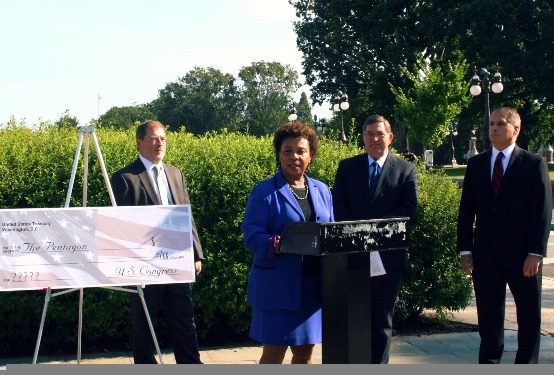Pentagon Audit Goes Once More Into the Breach

H.R. 5126 is the latest effort in a longstanding and increasingly bipartisan movement to send the Pentagon sailing into the azure waters of Sound Fiscal Policy. The bill is sponsored by Rep. Barbara Lee (D-Calif.), and co-sponsored by Reps. Michael Burgess (R-Texas), Dan Benishek (R-Mich.), and Jan Schakowsky (D-Ill.).
For those seeking immediate, significant cuts to military spending, the measure might be less than satisfying, but Jill Shatzen, Communications Director for Rep. Burgess, said that the primary goal of the bill was to “put a little pressure on them in order to gain compliance.” The bill will “reduce by one-half of one percent the discretionary budget authority of any Federal agency for a fiscal year if [it] does not receive a qualified or unqualified audit opinion by an external independent auditor[.]” A similar bill proposing five percent budget penalties for un-auditable Pentagon programs failed in 2013, so a more modest approach has been taken.
Led by Rafael DeGennaro, the Audit the Pentagon Coalition has secured endorsements from a diverse range of political figures. “[H.R. 5126] is a well-crafted and moderate piece of legislation,” DeGennaro said at a press conference. “It’s backed by a broad coalition: from Grover Norquist on the right to Ralph Nader — who endorsed it only recently — to Code Pink on the left.”
The law that H.R. 5126 seeks to enforce, passed in 1990, required the Pentagon to pass an annual audit and has been utterly disregarded since. “The current law is strong and clear,” said DeGennaro, “The deadline was [25] years ago. We need to impose immediate financial consequences on un-auditable agencies.” Norquist, the founder and president of Americans for Tax Reform, emphasized at a press conference that establishing baseline accountability is an important first step to reform, regardless of political affiliation. “There is always going to be a discussion on how and what to spend on defense,” Norquist said, “but do any of us know how much we are spending? You can’t begin to have a conversation without the facts.” Norquist is a long-time supporter of the effort to audit the Pentagon. TAC‘s Michael Ostrolenk interviewed him in 2012 about his efforts at the time. During the interview, he quipped that “[s]pending is not caring. Spending is what politicians do instead of caring.”
DeGennaro said that by requiring each individual agency to be responsible for passing an audit, H.R. 5126 sidesteps the mistake of treating the Pentagon as a “monolith.” Necessary spending cuts can be decided once the numbers are available and the agencies are once more operating within definable boundaries.
Lt. Col. Tony Shaffer, a former officer with the Defense Intelligence Agency, strongly supported the Pentagon audit in a 2013 interview with TAC: “Audit the Pentagon?” he asked. “Absolutely—a no brainer. Just do it.”
Comments